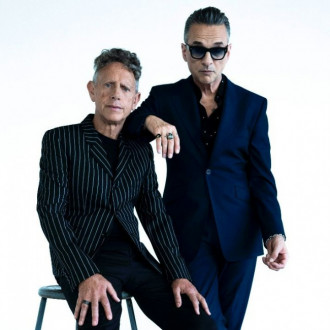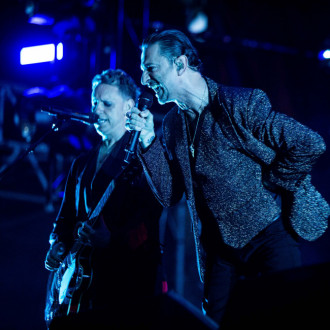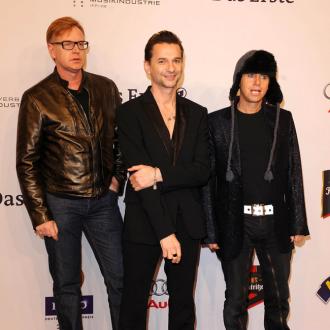Review of Delta Machine Album by Depeche Mode
A lot has happened in the four years since Depeche Mode released their last record. An Austrian skydiver jumped from space, the Conservative and Liberal parties formed a coalition government, London hosted the Olympic Games for the first time in over half a Century and Jorge Mario Bergoglio became the first Argentinian pope. At the same time, singer Dave Gahan was diagnosed with a tumour on his bladder, which put the brakes on the world tour for the band's last album, 2009's 'Sounds Of The Universe'. Thankfully, the growth was treated before it had chance to spread, allowing the band to reschedule those cancelled shows culminating in a headline slot at the following year's Lollapalooza festival in Chicago. In the meantime, fellow songwriter and occasional singer Martin Gore got himself into a Twitter spat with none other than Simon Cowell after initially stating the pop mogul should be shot.

Not exactly business as usual then, and far removed from the clean cut image portrayed by the four then-teenage Basildon boys whose song 'Photographic' had created such a stir on a low-key compilation album over three decades earlier. Of course, the ensuing time period has confirmed Depeche Mode to be anything but conventional. Over the course of their previous twelve albums, they've embraced any number of genres from avant-garde electronica, pop, soul, techno, industrial rock and even metal. All the while enlisting a burgeoning and religiously devoted worldwide fanbase almost every one of their peers would happily sacrifice their right arms for.
It's also to their credit that they've gradually stepped further away from the synthetic pop sound of their first record with every subsequent release. Preferring instead to set up base camp left of centre and ultimately remain there, it should come as no surprise to learn that 'Delta Machine' largely operates from the same ballpark. Terse and industrially harsh in places, at times an uneasy - if never unpleasant - listen, it isn't so much the sound of three fifty-year-olds wrestling with their demons. Instead, the core surviving trio of Gahan, Gore and Andy Fletcher seem intent on antagonising those demons into an indeterminable rage. And as a result, 'Delta Machine' feels a whole lot more energised rather than exorcised for it.
Take the darkly orchestrated, Kraftwerk go oriental 'My Little Universe' for example. Gahan's vocal presence devastating throughout, full of rasping menace as he utters the words "Here I am king, I decide everything, I let no one in" by way of a chorus. Indeed, there's a possibility the band have been brushing up on dance music's less commercial side. Abstract rhythms and industrial beats punctuate 'Delta Machine' on the majority of its thirteen tracks. While Ben Hillier has to take a share of the plaudits once more for its mostly extreme production, there's a distinct feeling its creators are becoming more aggressive in their old age when it comes to constructing songs.
Opener 'Welcome To My World' throws down the gauntlet from the beginning, echoes of Nine Inch Nails and Portishead bounding through its dark, robotic heartbeat. The self-confessional likes of gospel-tinged 'Angel' ("Lord I felt so small") and the Kurt Uenala co-penned Berlin-esque carousel grinder 'Secret To The End' ("Did I disappoint you?") suggest Gahan was in a reflective mood during much of the writing process for the record. Even the countrified twang of exit piece 'Goodbye' has a poignantly finite grace running through its (and 'Delta Machine''s closing) five minutes.
Even on the record's lighter moments, particular on the playfully melodic 'Broken' and heavy Trent Reznor inspired centrepiece 'Soft Touch/Raw Nerve', there's a sinister overtone prevalent in lines like "If you want control without any pain, how long will you suffer?" 'Soothe My Soul' too casts Gahan in the persona of a vampire, uttering the words "I'm coming for you when the sun goes down" like the stepchild of Vincent Price.
Sometimes 'Delta Machine' borders on the cheesy. 'Alone' mopes along at mid-pace before attaining a canter when Gahan suggests to its subject "I can save your soul, I could even take your home" in tawdry cat/sat/mat fashion. Similarly 'Should Be Higher', an obvious reference to the singer's previously well-documented battle with hard drugs apes David Bowie and Iggy Pop's 'Nightclubbing' far too closely for comfort while resorting to self-pity without ever adopting any charisma or attitude of its own.
However, 'Delta Machine' is a worthy comeback that while not quite hitting the peaks conquered so magnificently by 'Black Celebration', 'Violator' and 'Songs Of Faith And Devotion' back in the day, still sits comfortably in the upper quartile of Depeche Mode's finest releases to date.
Dom Gourlay
Official Site - http://www.depechemode.com














